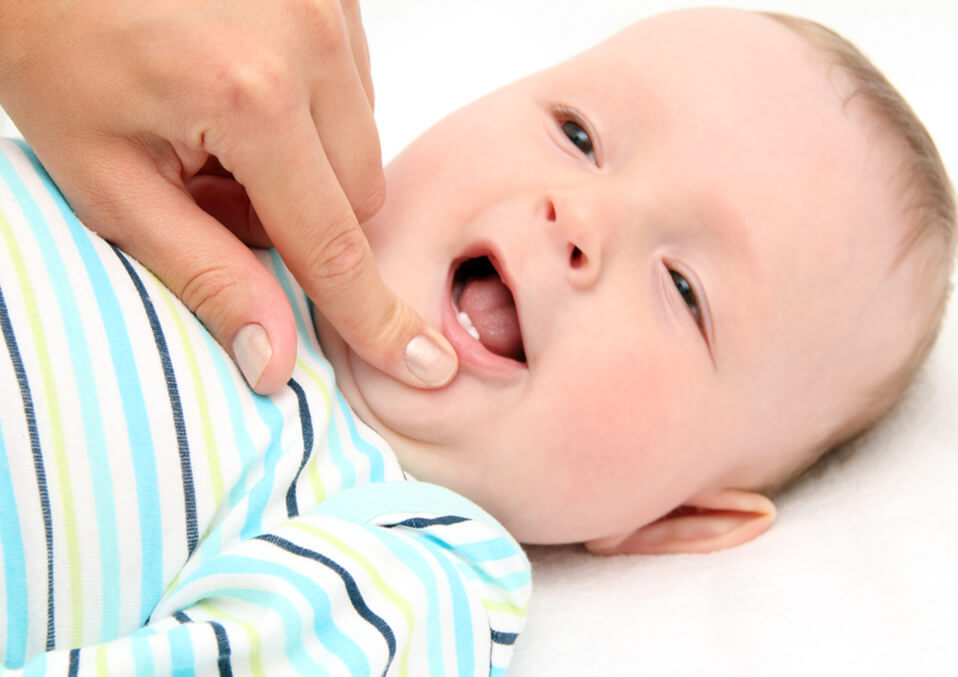
As a baby grows, every parent is keen on the changes and development that is happening to him. Some may even be documenting their baby’s firsts – first step, first smile, first word, and first crawl and so on. And one more thing that parents are waiting for is their babies’ first set of teeth. Baby’s teething is such an exciting experience for parents, worthy to be documented in videos and photos.
Teething is the process by which an infant’s first teeth, which are often called baby teeth or milk teeth start emerging through the gum. It is also known as cutting a tooth, with the idea that the gums are cut, or rubbed for the teeth to erupt. Teething usually comes in pairs.
Although teething varies among babies, research shows that it often happens between the ages of 6 to 12 months.
What are the signs of teething?

Although these symptoms are not the same for every baby, it may include either of the following:
- Swollen and tender gums
- Rubbing of gums
- A mild fever
- Restlessness and irritability
- Drooling
- Crying
- Gnawing and a desire to chew something
- Changes in sleeping and eating pattern
Teething can be painful for your little ones. But there are several ways to lessen the pain and discomfort that it may bring.
Considering the timeline, dentists considered teething as early, average and delayed. Teeth erupting before the 6th month is considered early teething. If teething does not happen in the thirteenth month, it is considered delayed teething. But there are babies born with teeth. Teething differs among one baby to another.
Possible causes

Several factors may cause delayed teething. One can be genetics or hereditary. If you and your partner’s family has a record of late teething, chances are your baby will experience the same. It will run in the family.
Poor nutrition also leads to delayed teething. Breast milk and baby formula contain calcium that the baby needs for the development of bones and teeth. Not getting enough may lead to delayed tooth eruption.
Hypothyroidism is when the thyroid gland cannot produce enough hormones for the body to function normally. It will not only affect teething but even other baby’s milestones like walking, crawling or teething.
If these factors do not affect the baby and you have observed that the baby’s hair, skin and bone growth are normal, there is no need to worry. Your child might only have delayed teething.
The better side of it

Some mothers who have babies who have late teething considers some of the pros of having one. First, they believe that the baby can handle teething better when it started later. The mother observed that her baby doesn’t even show signs nor suffer the discomfort of teething. The teeth just emerged.
Also, there is a less chance of early decay. Other mothers complain of tooth decay on their one-year-olds. Since the teeth appeared late, so will tooth decay. Teeth cleaning will also be easier by this time. It is also a possibility that those with delayed teething will get a set of permanent teeth later too.
And one more thing, gummy smiles and grins are cute. You can enjoy your baby’s baby look a little longer.
Late teething myths debunked
Superstitions tell that late-teething child should not face the mirror before his first birthday. Doing it minus the first set of teeth may spell bad luck. Of course, it is not proven true but some cultures have a strong belief in the connection of bad luck and reflections.
On the contrary, others believe that late teething is a sign of good luck as the baby will bring fortune to the family.
Another folk belief with an ambiguous roots is that late teething makes the baby a thief. Luckily, there is no proven connection between any crime and late teething.
One Chinese superstition is that “a child who cuts his teeth comparatively late will support his parents in their old age.” If this is true, parents may wish their child to be late-bloomers. There are also stories that those born with natal teeth are monsters. They consider it as a bad omen that they order the extraction of those teeth.
Late teething doesn’t equate to healthier teeth. Proper care should be a priority.
Another superstitious belief links teething with intelligence. Some say that delayed teething in an infant can be a sign of intelligence. In contrast, other says that early teething means greater intelligence. Legends has it that both Julius Caesar and Napoleon Bonaparte were born with natal teeth. But it cannot be proven true. Children with high IQ can either be early or late bloomers.
These are myths and facts associated with late teething. Should you have any concern, it is always better to talk to your pediatrician to handle your baby’s specific case.


